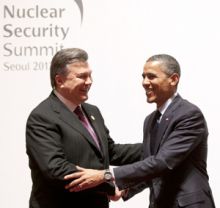SEOUL – The summit that was just now over became the biggest diplomatic event in the history of Korea. It gathered almost 5,000 delegates and 3,700 journalists in the capital of this country. The security of the summit was provided by about 40,000 law enforcement officers. The leaders of 53 countries participated in the summit, including the president of Ukraine.
The main goal of the two days’ summit was the elaboration of mechanisms to prevent non-proliferation of nuclear materials. According to the experts’ estimations, the amount of highly enriched uranium and plutonium that is kept at civil facilities around the world is enough to produce 5 and 30 thousand of warheads, respectively. Therefore it is no wonder that North Korea dominated the agenda of the first day, after it recently announced its intention to launch a satellite with the help of its own ballistic missile. It should be mentioned that this country produces nuclear weapons, and when it is going to possess carrier rockets, it will be able to deliver warheads to any spot in the world. The president of the US Barack Obama paid a special visit to the demilitarized zone in the north of Korea to express his worry and support his ally in this region. It is remarlable that Seoul’s and Washington’s concerns about Pyongang’s plans are shared by China and Russia. By the way, such a statement was made by Beijing after the 90-minute meeting between Obama and Hu Jintao.
The governments of the US, France, Belgium, and South Korea offered a practical initiative to transfer nuclear power stations from highly enriched to low-enriched uranium before 2015. According to the joint statement by these countries, which was announced during the summit, they agreed to produce the low-enriched uranium rods and offer them to other countries. The US will provide low-enriched uranium, South Korea will process it into powder, and France will make nuclear fuel out of it. The rods will be tested by Belgium, since it has a lot of expertise in the field of isotope production and nuclear materials testing.
Ukraine confirmed its orientation on providing nuclear security by meeting the commitment to the program of disposing of highly enriched uranium. Ukraine has been supporting the global nuclear disarmament and non-proliferation for all 20 years of its independence. This was stated by the President of Ukraine Viktor Yanukovych in his speech at the Seoul summit. He also stated that the main goal of the global community in the area of nuclear security was the development of the adequate and clear legislation. In this context Yanukovych offered to us thee so-called “soft” international tools in order to respond to modern challenges in the field of nuclear security in a more flexible and efficient way. According to him, summits on physical nuclear security and the official documents declared there belong to those tools.
“Ukraine also supports the approach to consolidation and expansion of the existing international legal framework for physical nuclear security. The most important elements of this system are the Convention on the Physical Protection of Nuclear Material and its amendments, the International Convention for the Suppression of Acts of Nuclear Terrorism, and the UN Security Council Resolution No. 1540. Our country has ratified and made valid all of the legal tools mentioned above. We appeal to our partners to take similar action,” concluded the president. Yanukovych also noted that the removal of highly enriched uranium was initiated by the Ukrainian government in order to make the country safer. According to him, at the summit Ukraine initiated the creation of a research center for nuclear power plants staff training. “It would be helpful to use Ukraine’s 25-year-long expertise. Besides, Japan should also be involved in the creation of this center,” Yanukovych said to Ukrainian journalists at a press conference. He thinks that this matter, and well as carrying out Ukraine’s obligations on highly enriched uranium disposal, was informally discussed during the 15-minute meeting with the American president. Immediately after this Yanukovych had a meeting with the President of the EU Herman van Rompuy and the President of the European Commission Jose Manuel Barroso, which did not last long according to the Ukrainian president, because he had spent more time than it was planned conversating with the American president.








